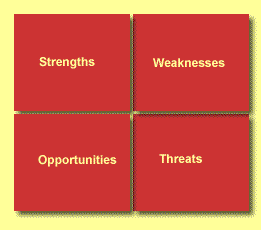 Last week I looked at the topic of thinking strategically. One critical dimension of this talent is the ability to see Strengths, Weaknesses, Opportunities and Threats. SWOT. Most of us are good at recognizing strengths and perhaps next at seeing opportunities but we’re usually not very good at finding weaknesses and even worse at seeing threats. If you want to get better at critically examining SWOT in your own organization then you need to be asking yourself these questions:
Last week I looked at the topic of thinking strategically. One critical dimension of this talent is the ability to see Strengths, Weaknesses, Opportunities and Threats. SWOT. Most of us are good at recognizing strengths and perhaps next at seeing opportunities but we’re usually not very good at finding weaknesses and even worse at seeing threats. If you want to get better at critically examining SWOT in your own organization then you need to be asking yourself these questions:
Strengths
For some reason, companies always state that their strength is their people. That’s too easy an answer, a bit self-serving, and in fact it doesn’t really matter to the customer.
- What are customers really buying? Is it Quality, Cost or Speed?
- How are we better at delivering these things to customers than the competition?
Weaknesses
Many organizations don’t like to be self critical. It’s not a good feeling but you better get over the adolescent angst because if you can’t see your weaknesses, your customers can and your competitors will capitalize on them.
- How are our competitors delivering better quality, lower cost of faster service than we are?
- Where is there confusion, conflict, and missed results in our customers minds?
Opportunities
People love new ideas, seeing in them myriad opportunities for new products or services. Ideas are fun but are they real opportunities?
- How can we deliver something to customers that sets a new and vastly different standard in quality, cost, or speed of service?
- Can we disrupt a market or find an entirely new market by reducing quality and cost drastically or increasing both by big margins?
Threats
The threat for any company is that some competitor will come out of left field to dramatically change the existing paradigm.
- What are customers hidden needs that we aren’t meeting that someone else could capitalize on?
- How is the customer changing in ways that we aren’t addressing?
If you’re paying attention, you’ll notice that if you’re thinking strategically, all of these questions are about the customer, not about you. In the end, the only thing that matters in SWOT analysis is the customer.
